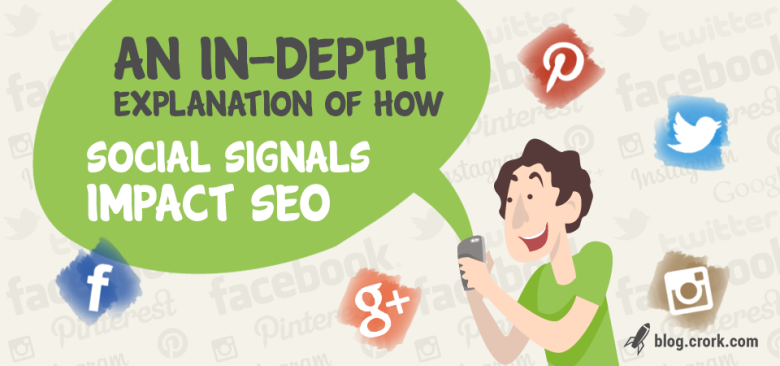An In-Depth Explanation Of How Social Signals Impact SEO
We live in the times of revolutionary minds, cutting-edge technology and impressive possibilities. Since the inclusion of the online world into our everyday lives, our evolution both in terms of awareness and knowledge has sprung up to incredible heights, and we are able to achieve more with less effort. It is an undeniable fact that since we started using the online world be it for entertainment or work, we have gathered incredible amounts of information at a global level. And today, we’re proud to inexorably stand out as a progressive global nation.
When it comes to our achievements on a global scale, one that can invincibly stand out happens to be the introduction of the cyberspace, and its benefits for public use. A new notion referred to as SEO or Search Engine Optimization sprang up, providing us with the chance to evolve as social beings. And up to now, we effectively make use of it to reach our goals concerning our financial and social positions. Therefore thanks to the SEO, we can now pave our own way to success with the rocket speed, run businesses, effective marketing campaigns, and interact with the surrounding world.
How Does SEO Of “Those Days” Differ From The SEO Of “These Days”?

We’re in a constant process of evolution, and just as it happens in the real world, the virtual world has the same properties. More than that, it can evolve even faster, and keeping pace with the swiftly changing, latest trends in the SEO realm might be somewhat challenging.
Back then, search engines used backlinks for page ranking. Even though it is considered to be outdated and almost off scene, backlinking strategy is still implemented in hopes of improving page ranks in search engines. But right now, what’s really making the most of SEO is the Social Media phenomenon.
Matt Cutts, the software engineer at Google, admitted in a video back in 2010 that Google makes use of the Social Media sites data for a proper site ranking.
The same does Bing. Therefore we can certainly affirm that the era of Social Media has already begun, and there’s pretty much nothing that can stop it from impacting SEO these days.
Those business owners and online marketers who try to keep up with the SEO tendencies know that, first and foremost, what really has to be put emphasis on is the so-called “recommendation” concept, – or sharing, as we usually call it.
What Does The “Recommendation” Concept Stand For?

The “recommendation” concept is what basically helps you gain potential traffic to your web page, and helps Google and other search engines appropriately rank your web page. It is what impacts search engines organically through Social Signals. What differentiates Social Signals from Backlinking is the natural manner in which your site earns trust – people read the content, and recommend it on their social networking sites such as Facebook, Google+, Instagram, Twitter, StumbleUpon, and so on.

This builds a bond of trust between you, the sharer and the search engine. But uniqueness and a high level of interestingness or curiosity are essential to obtain these Likes or Shares, or +1s, since a human component is necessary to get those social signals going.
What’s so highly regarded about the “recommendation” concept is that it can potentially impact your business much better than any other SEO strategy. And up to now, it is one of the most used ways in SEO to achieve good rankings in Google or other search engines.
How Do Social Signals Impact SEO?

You have to learn all the ins and outs of Social Media activity to know what makes socials signals stand out from the rest of SEO strategies. Basically, there are 4 main aims of social signals that you have to learn about:
- Social signals help social engines advise users on the best content on the web;
- Social signals increase social presence in order to build brand loyalty;
- Social signals share your site’s reputation with the target audience;
- Social signals help users distinguish good content from bad content.
Now, let’s dig somewhat deeper and see how social signals impact SEO on a larger scale.
- The battle between the organic and inorganic SEO has resulted in the defeat of the latter. The world is becoming more social, and an ever-increasing number of people spanning different age groups sign up for profiles on many different social networking sites, be it to socialize or kill their free time. And the truth is that content shared on such social media sites as Facebook, Twitter, Instagram and others, carries quite a substantial level of interestingness which is measured based on the amount of likes and shares a post gets. You can spend an entire day perusing the shared links and connecting with the audience.
Based on the latest statistics, Facebook is used by more than 1.23 billion active users whilst Google+ counts more than 2.5 billion engaged users showing constant activity on their profiles. Instagram has more than 300 million active users up to now. And Pinterest, which is mostly cherished by women (more than 85 females), form a good 72.8 million active users. Therefore you understand to what degree you would benefit from organic SEO strategies, namely, social signals.
- Each social signal stands for a “Vote” from the user who appreciates the content and wants to share it with his friends. Based on the concept of conversion which has a powerful standing in the organic SEO, one Facebook share can lead to more shares, which in its turn can definitely double your conversions in pretty much no time. In such a situation, you will kill two birds with one stone – increase your social presence and build your own reputation. Reputation is essential for people to trust you as a credible and authoritative source.
- Google ranks well those sites that receive substantial traffic. And social signals can help you achieve this goal. Since the strategies used are organic, meaning that people share your content because they like it, you get more target traffic interested to find out what you have to offer. Blog posts, videos, infographics, listings, and etc, generate the most traffic. And the more interesting content you have, the more likely that time on site and low bounce rate will be enough for Google to rank your site well.
Let’s make it a little bit easier:
You publish a great infographic on your site.
People like the post and share it with their friends.
Their friends like and comment on the post.
They visit the web page.
They use the infographic as a reference in a discussion board or a forum.
People search for it in Google.
People find your site, visit it and read more of your content.
They share your other posts.
Google, in its turn, ranks it high!
This is a very simple and straightforward explanation of how it works.
Now that you understand to what degree social signals impact SEO, you can think of using them to get more traffic to your site, earn credibility and reputation for search engines to rank you high!








